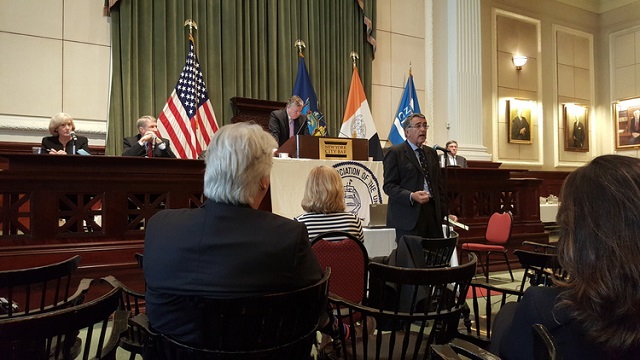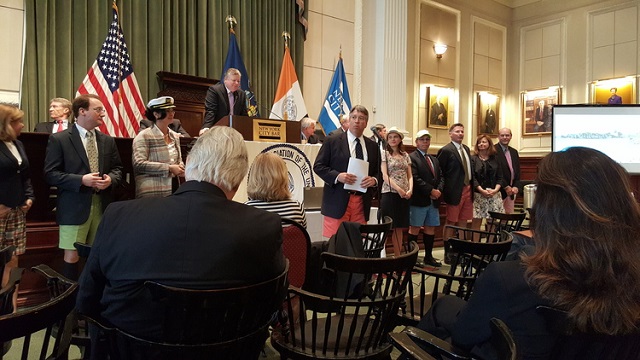Blog: Live From New York
Maritime conference season is still in full swing with the Maritime Law Association of the United States (established 1899) hosting its annual gathering in New York. This is the largest single maritime conference in the world, with well over 1,000 attendees spread across multiple work groups and other events, including the closing dinner at Cipriani's in downtown.
The excitement was palpable, and thanks certainly goes to the New York City Bar for the great venue as well as a number of NYC firms that provided conference space.
We were invited to speak about the European attitudes toward the Rotterdam Rules at the offices of Curtis Mallet in the 37th floor of 101 Park Avenue, an imposing, glossy black skyscraper. The Rotterdam Rules revise the legal and political framework for maritime carriage of goods by providing a modern, comprehensive, uniform legal regime governing the rights and obligations of shippers, carriers and consignees under a contract for door-to-door shipments that involve international sea transport.
Our presentation touched on the significant recent changes to the German HGB tax laws, but the presentation moved then into the European perspective on the Rotterdam Rules ("the Rules").
Our opinions were duly disclosed prior to attendance with the title: "Does Germany’s Maritime Law Reform Signal Troubled Waters for the Rotterdam Rules in the EU?" Despite their moniker, the Rules have not had the uptake in Europe that was expected at the exciting signing ceremony in Rotterdam in 2009. The mood at the ceremony, captured in the commemorative DVD released immediately following, was one of congratulatory optimism.
A record number of countries signed the Rules, but only three have ratified since then (Spain, the Congo and Togo). The Rules have not, as of yet, lived up to the hype. Our thesis: Although the discussion of the Rules at the supranational level in the EU has mostly died down since 2010, the discussion is still taking place at the national (i.e. Member State) level in some countries.
This was, perhaps, a sobering experience for our American friends, and the chairwoman described our presentation as "frank." The initial question for the debate that followed the presentation was: if the United States ratified the Rules, would the rest of Europe follow?
The reality is that European states have been aware of the Rules for some time now, and have already thoroughly debated their merits. Some countries, like Germany, have implemented certain provisions into law while dismissing others (e.g. the liability increase from two Special Drawing Rights (SDRs) to three SDRs per kilogram of cargo). Such "cherry picking" was the worst scenario from the standpoint of the American committee.
On the other end of the spectrum and to the north we have Denmark. In June 2013, the Danish parliament passed the legislation that would automatically implement the Rules in Demark upon Denmark's ratification. The Rules will not themselves be given effect in Demark but will be, instead, transformed into Danish law vis-a-vis the Danish Merchant Shipping Act. Denmark's ratification is pending the ratification by a major maritime country.
One question that remains, not only in Denmark, is what constitutes a "major maritime country." There continues to be uncertainty as to what constitutes a "major maritime jurisdiction." Most if not all countries have both China and the US on their unofficial list, but Japan, the UK and Germany are also on most lists, whether alone or together.
Holland, as it stands now, will not cherry pick and will instead wait for the Rules to be accepted internationally - or rejected. Although this could be seen as an exercise in remarkable and admirable restraint, the decision is likely more pragmatic. For example, the Netherlands does not face the inland transport logistical difficulties that other countries face (i.e., concerns over multi-modal transportation are more an international issue for the Dutch than national one) and, as such, they may see little value in expending limited political capital making unilateral reforms that have not been taken up by the rest of the world (or at least a large part of it).
In any case, we do feel that the clock is ticking, and we made this clear to the audience. Further still, the limited momentum that does exist is dissipating. The German Maritime Law Reform Act of 2013 demonstrated that Berlin is more than willing to go ahead with its own goals and actively reject and/or dismiss the Rules' suggestions. Germany also co-opted many major selling points of the Rules, e.g. electronic bills of lading, and implemented these into national legislation - removing much of the sense of urgency.
The new German Commercial Code is, in most respects, adequately modern without the influence or addition of Rules elements. And since maritime law reforms in Germany have traditionally been the work of long decades of experts laboring in obscurity, the likelihood of a fresh effort is low.
We will be polishing our presentation into a final paper to be published, ideally by the year's end and will update the article and these pages accordingly when the paper is released.
 A real highlight of the MLA meeting was Comite Maritime Internationale (CMI) Secretary-General John Hare, who spoke eloquently about the need to address the Rules and push them into binding law before the window of opportunity closes forever. His refrain: "It is now or never."
A real highlight of the MLA meeting was Comite Maritime Internationale (CMI) Secretary-General John Hare, who spoke eloquently about the need to address the Rules and push them into binding law before the window of opportunity closes forever. His refrain: "It is now or never."
This was a similar sentiment expressed in 2009 at the signing ceremony by then CMI President Karl-Johan Gombrii: "As has been said many times today, this is really the chance to get a new convention, replacing all the existing regimes, and it is not realistic to believe that anybody will make another attempt within thirty, forty, fifty years. So this really is the opportunity."
Mr Hare noted that the CMI has been pushing the Rules in the past six years relentlessly, having annual meetings instead of meetings every 2-3 years, as normal. The next meeting is scheduled for later this year in Istanbul, where further debates will be held and recommendations made vis-a-vis the Rotterdam Rules. These extraordinary meetings, in such rapid succession, are an attempt to re-energize maritime countries and to address the concerns raised by various hold-outs (like certain American ports).
One attorney remarked, roughly, that the dislike of the Rotterdam Rules in the United States is due to one single powerful legislator who has the ear of ports. And if the drafters of the Rotterdam Rules had known that the American ports would have raised such a fuss, then they would have been exempted from certain liability provisions (presumably referring to the "actual carrier" rule, which states that whoever is handling the cargo, even if it is a port terminal, is the carrier in that moment).

Since we are in America after all, a bit of whimsy is both expected and welcomed; in a memorable announcement of the next conference's sunny, warm and inviting locale in Bermuda, a British colony, the planning committee managed to persuade a not insignificant number of suited men and women to throw caution to the wind (and incite perhaps a few questionable glances) and dress in - your eyes do not lie - Bermuda shorts. Although the line between Bermuda shorts and just shorts may have been blurred, the gesture and visual was not lost on the crowd and enthusiastic good cheer was had by all.

The social program to round off the intellectual portion of the MLA conference was just as stunning. We met at elegant Cipriani's in the Financial District in truly breathtaking surroundings. It is fair to say that our senses were somewhat dull by the overstimulation offered by New York City. But we coasted through the evening and found it to be very rewarding, spending time with BIMCO's Deputy Secretary General Soren Larssen and my esteemed German colleague Professor Dr. Dieter Schwampe of Hamburg's law firm Dabelstein & Passehl.
It is fair to say that the MLA conference is not only a national draw, collecting the elite of the US maritime scene, but also an international locus of maritime talent and insight - we certainly look forward to attending again next year when the CMI and the MLAUS join forces and hold a joint conference again in NYC in May 2016.

that matters most
Get the latest maritime news delivered to your inbox daily.
To conclude, we offer a vertigo-inducing diagonal photograph of the cupola at Cipirani's.

The opinions expressed herein are the author's and not necessarily those of The Maritime Executive.
